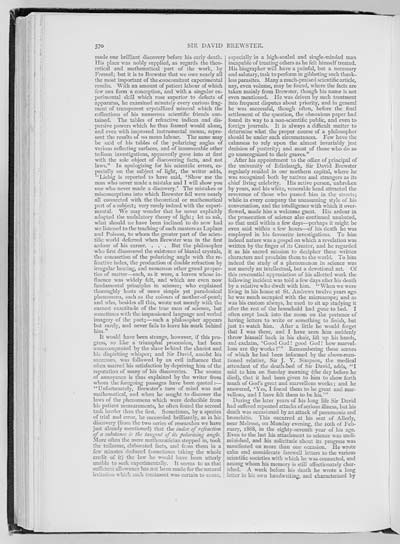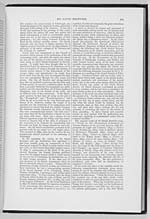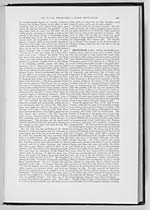Volume 3 > Half-Volume 6
(216) Page 570
Download files
Individual page:
Thumbnail gallery: Grid view | List view

570 made one brilliant discovery before his early death. His place was nobly supplied, as regards the theo- retical and mathematical part of the work, by Fresnel; but it is to Brewster that we owe nearly all the most important of the concomitant experimental results. With an amount of patient labour of which few can form a conception, and with a singular ex- perimental skill which rose superior to defects of apparatus, he examined minutely every curious frag- ment of transparent crystallized mineral which the collections of his numerous scientific friends con- tained. The tables of refractive indices and dis- persive powers which he thus framed would alone, and even with improved instrumental means, repre- sent the results of no mean labour. The same may be said of his tables of the polarizing angles of various reflecting surfaces, and of innumerable other tedious investigations, apparently gone into at first with the sole object of discovering facts, and not laws." In apologizing for his scientific errors, es- pecially on the subject of light, the writer adds, "Liebig is reported to have said, 'Show me the man who never made a mistake and I will show you one who never made a discovery.' The mistakes or misconceptions into which Brewster fell were nearly all connected with the theoretical or mathematical part of a subject; very rarely indeed with the experi- mental. We may wonder that he never explicitly adopted the undulatory theory of light; let us ask, what should we have been inclined to do now had we listened to the teaching of such masters as Laplace and Poisson, to whom the greater part of the scien- tific world deferred when Brewster was in the first ardour of his career. . . . But the philosopher who first discovered the existence of biaxial crystals, the connection of the polarizing angle with the re- fractive index, the production of double refraction by irregular heating, and numerous other grand proper- ties of matter�each, as it were, a leaven whose in- fluence was widely felt, and which are even now fundamental principles in science; who explained thoroughly hosts of more simple yet paradoxical phenomena, such as the colours of mother-of-pearl; and who, besides all this, wrote not merely with the earnest exactitude of the true man of science, but sometimes with the impassioned language and verbal imagery of the poet;�such a philosopher appears but rarely, and never fails to leave his mark behind him." It would have been strange, however, if this pro- gress, so like a triumphal procession, had been unaccompanied by the slave behind the chariot and his dispiriting whisper; and Sir David, amidst his successes, was followed by an evil influence that often marred his satisfaction by depriving him of the reputation of many of his discoveries. The source of annoyance is thus explained by the writer from whom the foregoing passages have been quoted:� "Unfortunately, Brewster's turn of mind was not mathematical, and when he sought to discover the laws of the phenomena which were deducible from his patient measurements, he often found the second task harder than the first. Sometimes, by a species of trial and error, he succeeded brilliantly, as in his discovery (from the two series of researches we have just already mentioned) that the index of refraction of a substance is the tangent of its polarizing angle. More often the mere mathematician stepped in, took the toilsome, elaborated facts, and from them in a few minutes deduced (sometimes taking the whole credit of it) the law he would have been utterly unable to seek experimentally. It seems to us that sufficient allowance has not been made for the natural irritation which such treatment was certain to cause, especially in a high-souled and single-minded man incapable of treating others as he felt himself treated. His biographer will have a painful, but a necessary and salutary, task to perform in gibbeting such thank- less parasites. Many a much-praised scientific article, nay, even volume, may be found, where the facts are taken mainly from Brewster, though his name is not even mentioned. He was driven by such treatment into frequent disputes about priority, and in general he was successful, though often, before the final settlement of the question, the obnoxious paper had found its way to a non-scientific public, and even to foreign journals. It is always a difficult matter to determine what the proper course of a philosopher should be under such circumstances. Few have the calmness to rely upon the almost invariably just decision of posterity; and most of those who do so go unrecognized to their graves." After his appointment to the office of principal of the university of Edinburgh, Sir David Brewster regularly resided in our northern capital, where he was recognized both by natives and strangers as its chief living celebrity. His active person, unbroken by years, and his white, venerable head attracted the reverence of those who passed him in the streets; while in every company the unassuming style of his conversation, and the intelligence with which it over- flowed, made him a welcome guest. His ardour in the prosecution of science also continued unabated, so that until within a few days�perhaps it might be even said within a few hours�of his death he was employed in his favourite investigations. To him indeed nature was a gospel on which a revelation was written by the finger of its Creator, and he regarded it as his sacred mission to decipher these written characters and proclaim them to the world. To him indeed the study of a phenomenon in science was not merely an intellectual, but a devotional act. Of this reverential appreciation of his allotted work the following incident was told a few days after his death by a relative who dwelt with him. " When we were living in his house at St. Andrews twelve years ago he was much occupied with the microscope; and as was his custom always, he used to sit up studying it after the rest of the household had gone to bed. I often crept back into the room on the pretence of having letters to write or something to finish, but just to watch him. After a little he would forget that I was there, and I have seen lam suddenly throw himself back in his chair, lift up his hands, and exclaim, 'Good God! good God! how marvel- lous are thy works !'" Remembering these scenes of which he had been informed by the above-men- tioned relative, Sir J. Y. Simpson, the medical attendant of the death-bed of Sir David, adds, "I said to him on Sunday morning (the day before he died), that it had been given to him to show forth much of God's great and marvellous works; and he answered, 'Yes, I found them to be great and mar- vellous, and I have felt them to be his.'" During the later years of his long life Sir David had suffered repeated attacks of serious illness, but his death was occasioned by an attack of pneumonia and bronchitis. This occurred at his seat of Allerly, near Melrose, on Monday evening, the loth of Feb- ruary, 1868, in the eighty-seventh year of his age. Even to the last his attachment to science was undi- minished, and his solicitude about its progress was manifested on more than one occasion. He wrote calm and considerate farewell letters to the various scientific societies with which he was connected, and among whom his memory is still affectionately cher- ished. A week before his death he wrote a long letter in his own handwriting, and characterized by
Set display mode to:
![]() Universal Viewer |
Universal Viewer | ![]() Mirador |
Large image | Transcription
Mirador |
Large image | Transcription
Images and transcriptions on this page, including medium image downloads, may be used under the Creative Commons Attribution 4.0 International Licence unless otherwise stated. ![]()
| Biographical dictionary of eminent Scotsmen > Volume 3 > Half-Volume 6 > (216) Page 570 |
|---|
| Permanent URL | https://digital.nls.uk/74514706 |
|---|---|
| Attribution and copyright: |
|
| Description | Volume III. Contains names alphabetically from Macadam to Young. |
|---|

